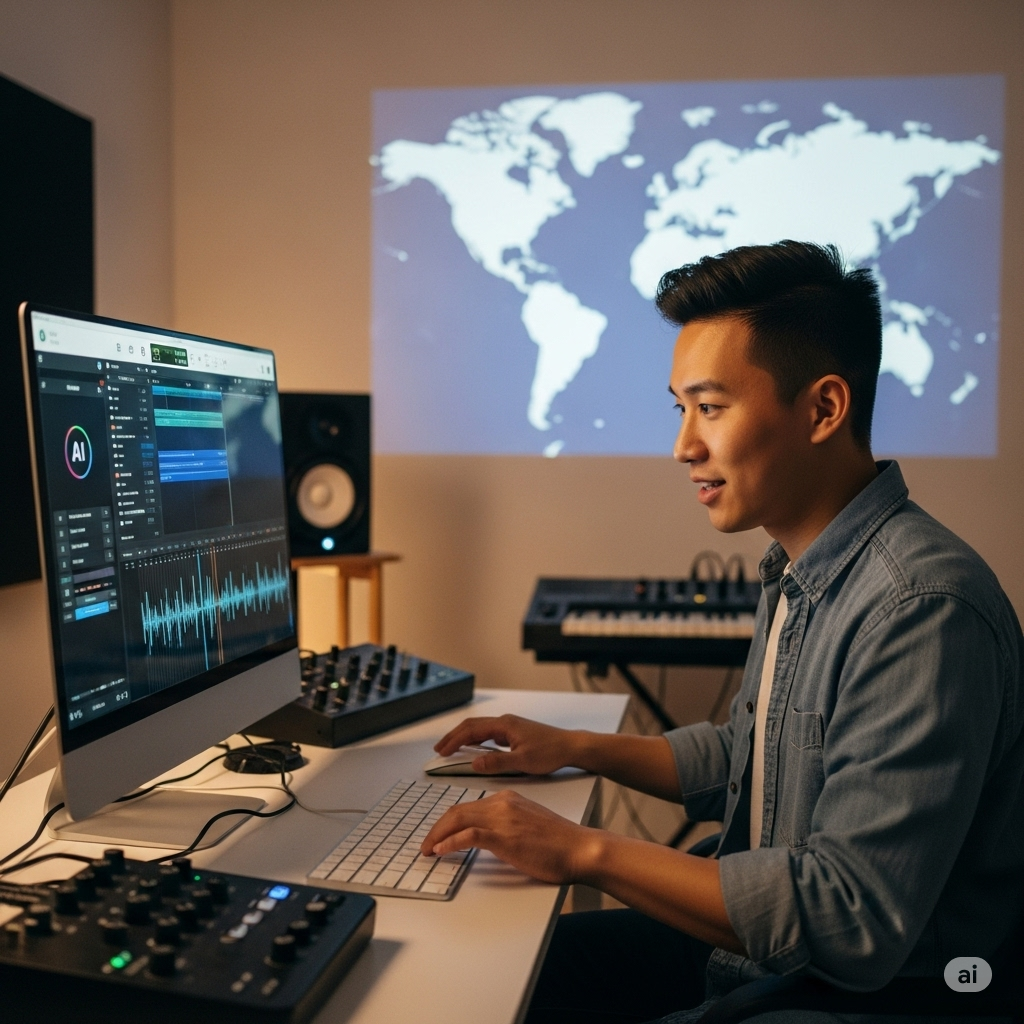Blogtubers – The Sound of the Future is no longer a concept—it’s already playing in our ears. In 2025, artificial intelligence (AI) is rewriting the rules of music production. From composing melodies to generating lyrics and mastering final tracks, AI-driven tools are now integral to the creative process. What once took days or weeks in a traditional studio setup can now be completed within hours—sometimes minutes.
This revolution is not just about speed; it’s about accessibility, experimentation, and redefining what it means to be a music creator in the digital age.
Sound of the Future in 2025: How AI Empowers the Next Generation of Producers
AI in music creation isn’t new, but in 2025, it’s matured. Tools like Amper Music, Boomy, AIVA, and Soundraw are enabling independent creators to make professional-sounding tracks without formal music training. These platforms use neural networks trained on millions of audio samples to generate melodies, harmonies, beats, and even full song arrangements.
According to Blogtubers, over 30% of new tracks uploaded to music platforms in Southeast Asia now involve AI in at least one part of their production. From bedroom producers to global artists, creators are embracing AI not as a threat, but as a co-creator.

How the Creative Process Has Changed
1. Lyric Generation and Melody Composition
AI text generators can now write emotionally intelligent lyrics in various languages and tones. Tools like ChatGPT or LyricStudio can generate verses based on a chosen mood, theme, or tempo. Artists often edit or remix these AI outputs, blending human emotion with machine precision.
Melody creation, meanwhile, is handled by platforms that understand musical scales, rhythm patterns, and genre-specific tendencies. AI tools can now mimic the compositional styles of artists like Billie Eilish, The Weeknd, or even Beethoven.
2. Real-Time Collaboration and Customization
In 2025, collaboration happens not just between humans, but between artists and algorithms. Musicians can input chord progressions, and the AI responds with basslines, drum patterns, or vocal harmony ideas—often in real time. AI plugins integrated into DAWs (Digital Audio Workstations) like Ableton Live or FL Studio have changed how songs evolve in the studio.
Blogtubers highlights a growing trend where producers use AI as a “creative assistant,” often prompting it with strange or experimental instructions to break conventional sound barriers.
Read more: “Cold Shower Challenge: Does It Boost Mood and Energy?“
Vocal Synthesis and Virtual Artists
Another major shift is AI-generated vocals. Synthetic voice engines like Vocaloid, Synthesizer V, and newer neural voice tech are producing hyper-realistic singing. These vocals can be adjusted for tone, emotion, and pronunciation—making it possible to create songs in any language or accent.
This has birthed a new generation of virtual artists—AI-driven personas with no human singer behind them. Think of them as digital pop stars. These avatars have fans, go on virtual tours, and release chart-topping songs entirely created by machines and human engineers.
A recent Blogtubers interview with a music label in Tokyo revealed that one of their AI singers has over 4 million monthly listeners on streaming platforms.
Genre Fusion and Sound Design in the Future of Music
AI allows for genre fusion and sound experimentation on a massive scale. You can now blend elements of lo-fi, Afrobeat, hyperpop, and jazz seamlessly. AI can generate new instrument combinations, or even invent new genres by blending acoustic samples with electronic layers never imagined before.
In this “anything-goes” era, Sound of the Future also reflects how cultural boundaries are being redefined. Tracks inspired by Balinese gamelan might feature drill beats and vaporwave synths, all thanks to AI’s ability to understand and fuse global music trends.
The Role of Data in Music Creation
AI music creation relies heavily on data—what listeners like, skip, or share. This data informs predictive models that shape what kind of music is likely to go viral.
Music platforms like Spotify and TikTok also integrate with AI creation tools, allowing artists to test how a snippet might perform based on algorithmic insights before releasing the full song.
This data-driven approach makes the creative process more strategic. Artists aren’t just composing; they’re analyzing.
Critics and Concerns
While AI in music is exciting, it isn’t without controversy.
- Authenticity: Can an AI-generated song carry the same emotional weight as one written by a human?
- Copyright issues: If an AI model is trained on copyrighted music, who owns the resulting output?
- Job displacement: Will songwriters, producers, or even vocalists become obsolete?
Ethicists, music guilds, and tech companies are debating these questions actively. Many suggest clearer policies and transparency in AI-assisted creations moving forward.
Accessibility and Democratization
Perhaps the most significant benefit of AI is accessibility. A 15-year-old with no musical training can now produce high-quality tracks. Someone living in a remote village can build a global fanbase without a studio or record label.
This democratization aligns with the Sound of the Future—a space where talent is no longer defined by geography, money, or connections, but by imagination and the ability to adapt to new tools.
What’s Next for the Sound of the Future in Music Tech?
By late 2025, expect even deeper integration of AI in:
- Live performances: AI musicians sharing the stage with humans
- Personalized soundtracks: Songs generated in real-time based on listener mood
- Emotion-sensing music: Adaptive sound that changes tempo or lyrics in response to your voice or facial expression
As quantum computing and neural networks evolve, AI music creation may reach levels of artistic depth we can’t yet imagine.
The Sound of the Future is no longer abstract—it’s here, remixing the very fabric of music as we know it. AI isn’t just a tool; it’s a collaborator, a trendsetter, and in some cases, an artist.
Whether you’re a traditional musician, a digital native, or just a curious listener, one thing is clear: the future of music is going to be louder, smarter, and more inclusive than ever before.
And if you’re wondering where to start exploring? Just follow the beat—AI will be right there with you.



